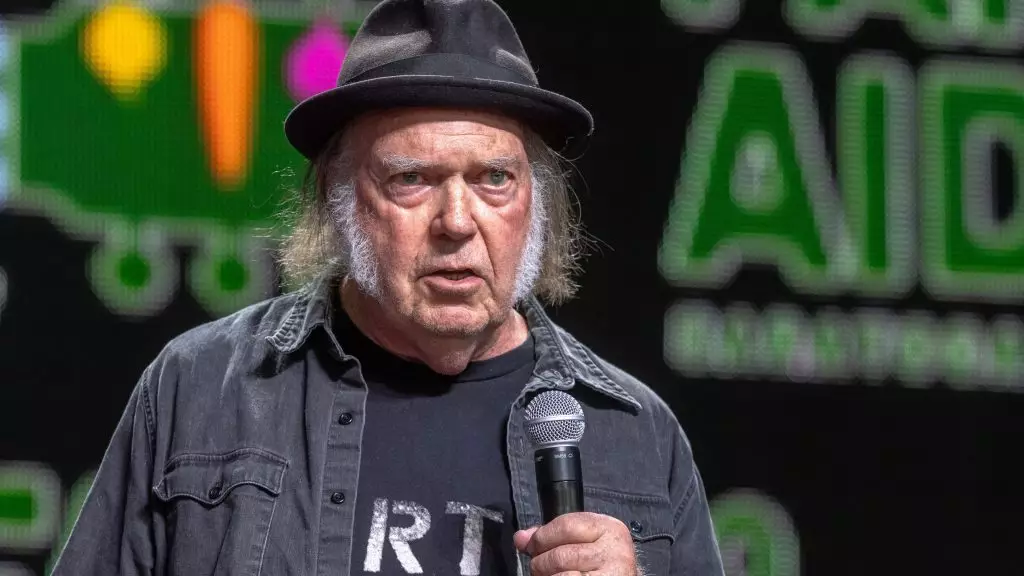In a surprising turn of events, iconic musician Neil Young has decided to perform at this year’s Glastonbury Festival, reversing his earlier announcement that he would not be taking the stage. This change of heart sheds light on the complexities of artist-festival relationships and highlights the growing tension surrounding corporate involvement in live music events.
Just a short while ago, Young expressed grave concerns about the commercialization of the Glastonbury Festival, a beloved event he has always cherished. The 79-year-old singer-songwriter made headlines when he openly criticized the festival for what he perceived as an overwhelming corporate presence, specifically pointing fingers at the BBC’s long-standing partnership with the event since 1997. In an earlier statement posted on the Neil Young Archives website, Young declared, “It seems Glastonbury is now under corporate control and is not the way I remember it being.” Such a strong stance showcases Young’s dedication to preserving the authenticity of live music experiences, a theme that has been a prominent aspect of his career.
Inevitably, Young’s previous remarks ignited considerable discussion among fans and music lovers. How does one balance artistic integrity with the inevitable partnerships that come with modern-day festivals? It raises a significant question: as music festivals evolve, at what point does artistic vision come into conflict with corporate interests? For Young, it appears this was a tipping point, prompting a decision to pull out of Glastonbury altogether in favor of venues that align more closely with his values.
A Change of Heart: The Power of Clarification
However, as swiftly as his declaration was made, it fell victim to a mix-up. Young later revealed that he was given incorrect information regarding the festival’s management and its dealings with the BBC. This revelation led to his renewed optimism and announcement that he would indeed take part in the much-anticipated event. His message to fans on his website was clear and appreciative, stating: “Happily, the festival is now back on our itinerary and we look forward to playing! Hope to see you there!”
Emily Eavis, co-organizer of Glastonbury and daughter of its founder, enthusiastically welcomed Young’s reversal, expressing her own excitement at having him headline the Pyramid stage in June. She noted, “Neil Young is an artist who’s very close to our hearts at Glastonbury,” emphasizing the mutual appreciation that exists between the artist and the festival.
This instance offers a valuable lesson about the importance of clear communication in the often chaotic world of music festivals. It underscores how easily misunderstandings can derail decisions that impact both artists and their fans.
The controversy surrounding Young’s initial departure highlights the broader dynamics at play in music festivals today, where corporate sponsorships are now commonplace. While partnerships with companies can afford festivals the financial backing necessary to host larger acts, there is a risk that it compromises the essence of what makes live performances special. Young’s previous withdrawal from Spotify in 2022 over concerns related to misinformation adds another layer to his principled stance—implying that he sees social and cultural implications beyond mere performance settings.
Ironically, despite his critiques about corporate control, Young is now set to grace the Glastonbury stage—an indication that although the fabric of music festivals has changed, artists and fans continue to navigate these waters together.
As the excitement around Glastonbury builds in anticipation of Young’s performance, one must consider the implications of this narrative. The balance between maintaining artistic integrity and capitalizing on corporate partnerships is delicate. Neil Young’s story serves as a reminder of the evolving music landscape and reinforces the need for open dialogue among artists, organizers, and fans. As he prepares to take the stage once more, perhaps it’s time to celebrate not only the music but also the resilience that artists like him bring to the industry. In the end, will the passion for music triumph over corporate influence, and can the festival remain a bastion of artistic expression? Only time will tell.
